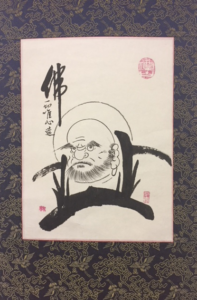
The Buddha taught the 4 Noble Truths. The first noble truth is the truth of suffering. Dukkha is the Pali term and is traditionally translated as “suffering,” but dukkha in a broader way means a sense of uneasiness, of sadness, of distress or of grief. The Buddha was right. Life encompasses all of that. We often come to Zen meditation because we have an existential sense that there is a happiness out there we have not discovered. We have a sense of unease that all is not right, that there is some truth that is hidden.
The Buddha instinctively left behind all his riches, his fame and his family to get quiet and examine the question and the unease that laid so heavy on his heart. He found what he was searching for when he looked up from his meditation and saw the morning star. When we sit in meditation we are following in his path. Zen meditation is the practice of becoming still and finding our still-point so that our original nature – our wide, open, clear mind is manifested in our daily life.
Zen Master Seung Sahn, the teacher who started the Kwan Um School of Zen, said very simply, “Zen is understanding yourself.” Interesting, isn’t it, that being quiet and looking at that question or that unease deeply, can answer the questions and angst of our heart? This fundamental original nature or Buddha nature is what we call “don’t know” mind or the “mind before thinking.” This “don’t know” mind is intuitive, expansive, compassionate and clear, helping us to live in this world with tranquility and wisdom so that we may help all beings who are suffering.
Sitting Zen helps us to see that.